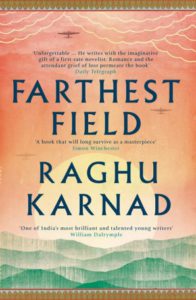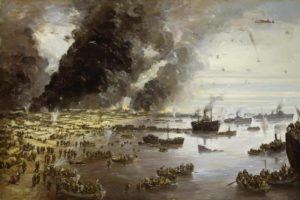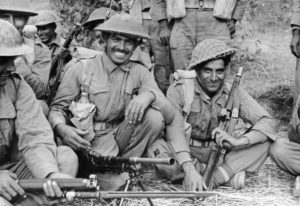Sneha Alexander recently completed an MA in Postcolonial Studies MA at SOAS University of London. Her interests include queer feminist theory and praxis, Britain’s racial politics and world literature.
Re-imagining Histories through Farthest Field: An Indian Story of the Second World War (Raghu Karnad)
Nations are narrated; they are consolidated and made real by the stories we tell. In this respect, national memory can work to create a sense of community and normalise the way we think about our own country’s place in the world. Yet, national memory should not be assumed to grow organically. Instead, it is constructed; both through the stories a nation chooses to tell, and the ones it chooses to hide.

The cover of Farthest Field [Accessed via William Collins]
Karnad, a writer and journalist based between Delhi and Bangalore, admits that at the beginning of his project, “Indians never figured in my idea of the war, or the war in my idea of India”.[2] He had never heard of the battles fought by the Indian Army at Imphal[3] and couldn’t understand how his grandfather Bobby came to be buried there.[4] Essayist and novelist Pankaj Mishra recently drew attention to how “colonial subjects remain marginal in popular histories” of the First World War as they are “largely uncommemorated by the hallowed rituals of Remembrance Day”.[5] The absence of colonial soldiers in narratives of British history is closely related to the ways in which we memorialise conflict. The “tombs of Unknown Soldiers” and cenotaphs are “saturated with ghostly national imaginings”[6] ostensibly committing these soldiers’ sacrifices to memory. However, the physical presence of such statues and centotaphs also facilitates a type of amnesia. While these monuments are supposedly universally representative, Nirwal Puwar notes that in the British collective imagination, there are certain caveats upon the idea of an Unknown Soldier. Puwar comments that one can “be certain that the figure of the ‘Unknown Soldier’ won’t be a Ram Das, Sawarn Singh or Rani Kapur; these non-white faces from the ex-colonies have been absolutely erased”.[7] This history, and the nation who narrates it, thus becomes “racialised”,[8] limiting conception of itself to a current geography of a small island that wishes to forget it’s imperial past.
“[T]he annals of the West would prefer to forget the colonial factors, and the annals of the post-colonial world would forget the war effort: each found their narrative too deeply unsettled by the other”. (Karnad. Farthest Field, p.242)
An Indian section of the 2nd Battalion, 7th Rajput Regiment about to go on patrol on the Arakan front in Burma, 1944 (War Office Second World War Official Collection)
Similarly, in India’s story of an independent “new nation state, there was no place for an army that fought for the Empire in the very hour that its countrymen fought to be rid of it”.[9] Bobby, Manek, Ganny and all the others who fought in Empire’s name are double casualties. Although the Second World War is commemorated and Indian Independence celebrated, there is no room for the fractious overlap of these two world-changing events. Erased at the very moment of memorialisation, both Britain and India seem to cordon off their histories to more clearly defined areas; allowing for unified and unproblematic depictions of national history.

The Withdrawal from Dunkirk, (June 1940). This image was created and released by the Imperial War Museum on the IWM Non Commercial Licence.
Karnad comments that “[n]o war has ever been committed more seriously to the conscience of memory”[10] and yet been simultaneously party to such sustained erasure. The idea of a British all-white war effort is often perpetuated in popular media, most recently in Christopher Nolan’s war film Dunkirk (2017). Sunny Singh comments that Nolan’s portrays “Britain as it exists today”, without a “global empire”.[11] In fact, “India lent its manpower to practically every theatre of war in which Britain was engaged, from the mule lines in Dunkirk to the garrisons of Diego Garcia”.[12] While providing this service, India was simultaneously at the mercy of brutal colonial policies such as the Bengal Famine. By locating Bobby, Manek and Ganny’s stories in colonial geographies – from North Africa to South East Asia – Karnad draws striking parallels to the “kind of imperial warfare” [13] occurring today “in much the same geography”.[14] In the Afterword, Karnad observes that “British forces were back in Basra, suppressing local resistance, sixty years after Bobby left from there” and “Ahmed Khel and Datta Khel, the very villages that Manek’s squadron flew out to discipline in 1941, were still being punished by predator drones in 2013”.[15] By drawing attention to geographies of past and present conflicts Karnad sheds light on continuities that cannot be ignored. Colonial histories formed the conflicts of today, as well as forming bordered notions of nation and history.
Mishra’s call for an identification of “the ways in which that past has infiltrated our present, and how it threatens to shape the future”[16] is perfectly answered in Farthest Field. The transnational reach of world literature, albeit – in this case – with the exclusivity of writing in English, allows for this kind of historical intervention. Uncomfortable subjects who do not fit into national narratives – such as Bobby, Manek and Ganny – are waiting to be rescued from obscurity. If nations are constantly narrated, world literature could offer a way to both re-imagine accepted histories and help them speak to the present. Perhaps Farthest Field’s greatest strength is to demonstrate that no history is fixed; to a either a certain narrative or a specific geography. In truth, as Karnad himself comments: “Fact is diffused at the edges; it’s all storytelling at the end”.[17]
Notes:
[1] Karnad, Raghu. Farthest Field: An Indian Story of the Second World War (William Collins: London, 2015) p.242
[2] Karnad. Farthest Field, p.xviii
[3] An important victory where Japan fought against Allied forces in Imphal – with the intent to invade India – but were driven back into Burma.
[4] Sripathi, Apoorva. “If you’re really lucky the story chooses you: Raghu Karnad” The Hindu (18 Jul. 2015)
[5] Mishra, Pankaj. “How Colonial Violence Came Home: the Ugly Truth of the First World War.”The Guardian (Guardian News and Media: 10 Nov. 2017)
[6] Anderson, Benedict. Imagined Communities: Reflections on the Origin and Spread of Nationalism (London, New York: Verso 2006) p.9
[7] Puwar. Nirmal. Space Invaders: Race, Gender and Bodies Out of Place (Oxford: Berg 2004) p.171
[8] Puwar. Space Invaders, p.171
[9] Karnad. Farthest Field, p.241
[10] Karnad. Farthest Field, p.237
[11] Singh, Sunny. “Why the lack of Indian and African faces in Dunkirk matters.” The Guardian (Guardian News and Media: 1 Aug. 2017)
[12] Karnad. Farthest Field, p.234
[13] Karnad. Farthest Field, p.240
[14] Karnad. Farthest Field, p.240
[15] Karnad. Farthest Field, p.240
[16] Mishra. “How Colonial Violence Came Home” The Guardian
[17] Sripathi. “If you’re really lucky the story chooses you: Raghu Karnad” The Hindu
Read the book
Karnad, Raghu. Farthest Field: An Indian Story of the Second World War (William Collins: London, 2015)
To find out more about Karnad’s work, visit his website or follow him on Twitter.
Further Reading
Anderson, Benedict. Imagined Communities: Reflections on the Origin and Spread of Nationalism (London, New York: Verso 2006)
Khan, Yasmin. The Raj at War: A People’s History of India’s Second World War (London: The Bodley Head 2015)
Mishra, Pankaj. “How Colonial Violence Came Home: the Ugly Truth of the First World War.”The Guardian (Guardian News and Media: 10 Nov. 2017)
Puwar, Nirmal. Space Invaders: Race, Gender and Bodies Out of Place (Oxford: Berg 2004)
Singh, Sunny. “Why the lack of Indian and African faces in Dunkirk matters.” The Guardian (Guardian News and Media: 1 Aug. 2017)
Sripathi, Apoorva. “If you’re really lucky the story chooses you: Raghu Karnad” The Hindu (18 Jul. 2015)



This is a wonderful review! I especially appreciate your recognition of the role of language, English in this case, in shaping the histories that we recount. Language makes some knowledges available, while occluding others. The structuring of postcolonial theories and their mapping onto the spaces of the former European empires is one example.